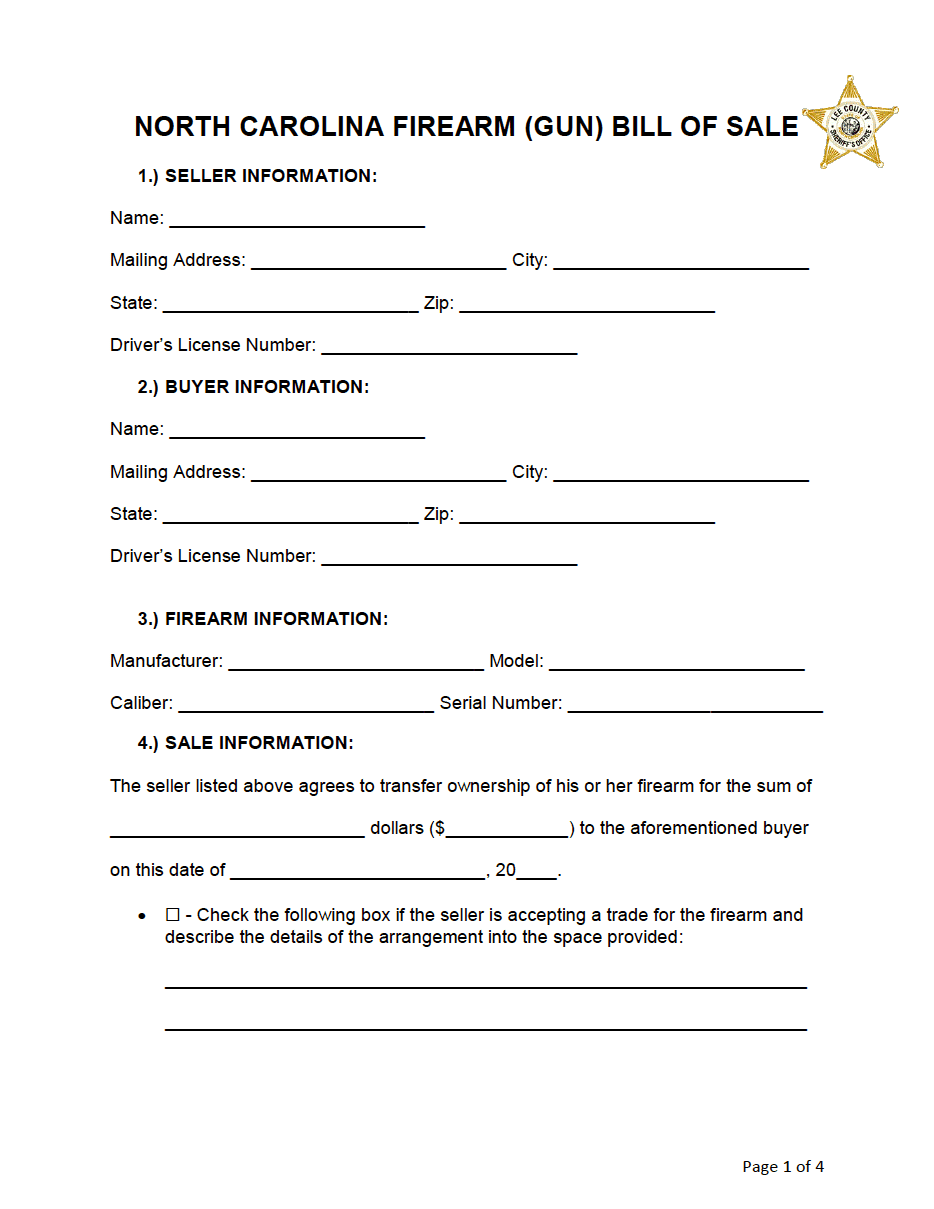North Carolina Firearm Bill of Sale Form
A North Carolina firearm bill of sale form is like a receipt for a gun purchase. It is a legal document used to record the transfer of a weapon from one person to another. Additionally, it ensures the sale happened legally, meaning neither party stole the gun nor used it unlawfully. The document also proves ownership, protects both individuals and allows either person to contact the other after the transaction.
|
What is a North Carolina Gun Bill of Sale?
A North Carolina gun bill of sale is a state-provided form designed to record the exchange of a firearm. It outlines the details of the buyer and seller, including their names, mailing addresses, and driver’s license numbers. Additionally, the document records the gun’s details, such as the manufacturer, model, caliber, and serial number. Both parties must clearly list the transaction price, sale date, and whether the transfer occurred by trade.
How to Apply for a Permit to Purchase
A permit is required to purchase, sell, gift, acquire, or otherwise transfer a handgun or pistol in North Carolina. Rifles, shotguns, antique firearms, and replicas do not require a permit. It is important to note that this permit is not the same as a concealed carry permit, for which the state requires a separate license.
The application process can be done online or in person; if done in person, the applicant must turn in the paperwork to their local county sheriff’s office. The online application costs $8, including a $5 fee and a $3 processing payment, while the in-person fee is $5.
Along with the application, the resident must have the necessary notarized release of court orders to prove mental health and capacity to obtain the permit. They must bring the completed paperwork to the sheriff’s office within five (5) days of notarization; otherwise, the county office will not process the information.
Additionally, fingerprints, proof of age, residency, and legal status are required. Individuals with a felony conviction, drug use or addiction, mental illness, or other disqualifications (i.e., arrests, license suspensions, dishonorable discharges, illegal residency status, etc.) are not eligible to apply. Depending on the county, processing can take anywhere from two to four weeks; the office will send a letter or email once the application has been approved or denied. Approved applicants must pick up their permit within 28 days, and rejected applicants can appeal if they wish to do so.
How to Apply for a Concealed Carry License
Concealed carry licenses differ from permits to purchase. Gun permits allow residents to possess, buy, or sell firearms, while concealed carry licenses enable them to have a gun hidden on their body in authorized public areas (§§ 14-269 to 14-277.8). To obtain a concealed carry license, one must be twenty-one (21) years old, pass all qualifications, and renew as required.
Step 1 – Qualifiers
Individuals applying for a North Carolina concealed carry permit must:
- Be a US citizen and resident of North Carolina for at least thirty (30) days prior;
- Be twenty-one (21) years or older;
- Not have physical or mental issues that interfere with their ability to handle a firearm;
- Have taken an approved firearms safety course;
- Not have any ineligibilities to own or receive a gun such as felonies, criminal offenses, fugitive status, illegal drug use or addictions, dishonorable discharges, or DUI charges within the past three (3) years;
- Not have other disqualifying factors as listed in the North Carolina Sheriffs’ Association Firearm Laws and Permits (p. 12-17).
Step 2 – Firearms Training
Before applying for a concealed carry permit in North Carolina, applicants must take and pass a firearms safety training course approved by the North Carolina Criminal Justice Standards Commission. However, law enforcement officers or officers who retired in the past two years are exempt from this requirement. Once applicants have completed the firearms training course, they do not need to renew their certification.
Step 3 – Appointment
To apply for a concealed carry permit, individuals must make an appointment with their local county sheriff and bring a firearms safety course certification and photo identification. The applicant will also need to pay $90 and complete an application. If the applicant’s county offers online applications, they may also carry out the process via their website. However, they still have to visit the local sheriff’s office for an application review.
Following the application, the resident must visit a Public Safety Center office to have a City-County Bureau of Identification (CCBI) agent take their fingerprints. The application payment includes the $10 fingerprint fee.
Step 4 – Processing
Applying for a concealed carry permit typically takes forty-five (45) days. After this time, the applicant receives a letter or email informing them of their approval or denial. If approved, they must collect their permit within twenty-eight (28) days, remembering to bring photo identification. If denied, the individual can appeal the decision.
Step 5 – Renewal
Individuals who possess a concealed carry permit must renew it every five (5) years at their local county sheriff’s office. The state does not require preliminaries such as fingerprinting or firearms training recertification for the renewal. To carry out the process, the individual must complete an Affidavit for Renewal of Concealed Handgun Permit and pay the associated fee. A permit holder can also renew their permit up to ninety (90) days before the expiration date. The applicant will receive their new license in the mail upon completing all renewal requirements.
